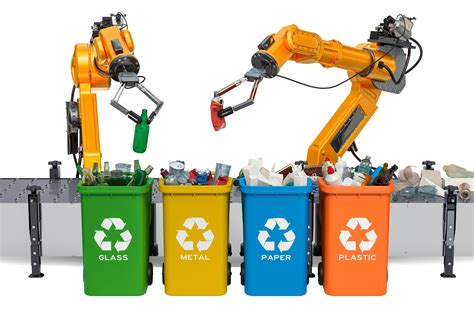The world is facing an unprecedented waste management crisis. With the global population projected to reach 9.7 billion by 2050, the amount of waste generated is expected to increase exponentially. However, a new era of waste management is emerging, one that harnesses the power of technology to transform waste into valuable resources. Hi-tech recycling is revolutionizing the way we think about waste, and it's changing the game for the environment, businesses, and communities worldwide.
The Problem with Traditional Waste Management
Traditional waste management methods are no longer sufficient to handle the sheer volume of waste generated today. Landfills are overflowing, and the environmental impact of waste disposal is devastating. The production and disposal of waste contribute to climate change, air and water pollution, and the destruction of ecosystems. Moreover, the economic costs of waste management are staggering, with the global waste management market projected to reach $1.5 trillion by 2025.
The Rise of Hi-Tech Recycling
Hi-tech recycling is a game-changer in the waste management industry. This innovative approach uses advanced technologies, such as artificial intelligence, robotics, and data analytics, to sort, process, and transform waste into valuable resources. Hi-tech recycling facilities can handle a wide range of materials, including plastics, metals, glass, and organic waste.

Benefits of Hi-Tech Recycling
Hi-tech recycling offers numerous benefits, including:
- Increased Efficiency: Hi-tech recycling facilities can process waste at a much faster rate than traditional facilities, reducing labor costs and increasing productivity.
- Improved Accuracy: Advanced technologies, such as computer vision and machine learning algorithms, can sort materials with greater accuracy, reducing contamination and increasing the quality of recyclables.
- Increased Revenue: Hi-tech recycling facilities can generate significant revenue from the sale of recyclable materials, reducing waste disposal costs and creating new business opportunities.
- Environmental Benefits: Hi-tech recycling reduces greenhouse gas emissions, conserves natural resources, and decreases the environmental impact of waste disposal.
Examples of Hi-Tech Recycling in Action
Several companies and cities are already leveraging hi-tech recycling to transform their waste management systems. For example:
- Waste Management's Single-Stream Recycling Facility: Waste Management's single-stream recycling facility in Chicago uses advanced technologies, including optical scanners and air jets, to sort recyclables from non-recyclables.
- The City of Oslo's Smart Recycling System: The City of Oslo has implemented a smart recycling system that uses sensors and data analytics to optimize waste collection and recycling rates.

The Future of Hi-Tech Recycling
The future of hi-tech recycling looks bright, with significant investments being made in research and development. Some of the exciting innovations on the horizon include:
- Artificial Intelligence-Powered Recycling: AI-powered recycling facilities can sort materials with greater accuracy and speed, reducing labor costs and increasing productivity.
- Robotics and Automation: Robotics and automation can improve the efficiency and safety of recycling facilities, reducing the risk of accidents and injuries.
- Data Analytics and IoT: Data analytics and IoT technologies can optimize waste collection and recycling rates, reducing waste disposal costs and increasing revenue from recyclable materials.
Gallery of Hi-Tech Recycling






FAQs
What is hi-tech recycling?
+Hi-tech recycling is an innovative approach to waste management that uses advanced technologies, such as artificial intelligence, robotics, and data analytics, to sort, process, and transform waste into valuable resources.
What are the benefits of hi-tech recycling?
+Hi-tech recycling offers numerous benefits, including increased efficiency, improved accuracy, increased revenue, and environmental benefits.
What is the future of hi-tech recycling?
+The future of hi-tech recycling looks bright, with significant investments being made in research and development. Exciting innovations on the horizon include AI-powered recycling, robotics and automation, and data analytics and IoT.
As the world continues to grapple with the challenges of waste management, hi-tech recycling offers a beacon of hope. By harnessing the power of technology, we can transform waste into valuable resources, reduce waste disposal costs, and create new business opportunities. The future of waste management is bright, and hi-tech recycling is leading the way.
